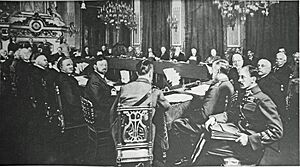Antonio Salandra facts for kids
Quick facts for kids
Antonio Salandra
|
|
|---|---|
 |
|
| Prime Minister of Italy | |
| In office 21 March 1914 – 18 June 1916 |
|
| Monarch | Victor Emmanuel III |
| Preceded by | Giovanni Giolitti |
| Succeeded by | Paolo Boselli |
| Personal details | |
| Born | August 13, 1853 Troia, Apulia, Kingdom of the Two Sicilies |
| Died | December 9, 1931 (aged 78) Rome, Kingdom of Italy |
| Political party | Historical Right (1901–1913) Liberal Union (1913–1922) Italian Liberal Party (1922–1924) |
| Alma mater | University of Naples |
| Profession | Journalist, politician, lawyer |
Antonio Salandra (born August 13, 1853 – died December 9, 1931) was an Italian politician. He was known for his conservative views. Salandra served as the 21st Prime Minister of Italy from 1914 to 1916. He played a key role in Italy joining World War I on the side of the Triple Entente. This group included the United Kingdom, France, and the Russian Empire. Italy joined to gain back lands with Italian speakers, a goal known as Italian irredentism.
Early Life and Career
Antonio Salandra was born in Troia, a town in Apulia, Italy. He studied at the University of Naples and graduated in 1875. After finishing his studies, he became a teacher. He later became a professor of administrative law at the University of Rome.
Salandra began his political career by serving in different government roles. From 1899 to 1900, he was the Minister of Agriculture. He also served as Minister of the Treasury in 1906. Later, from 1909 to 1910, he was Italy's Minister of Finance.
Becoming Prime Minister
In March 1914, Antonio Salandra became Prime Minister of Italy. He took over after the government of Giovanni Giolitti ended. Giolitti himself chose Salandra for the role. Salandra's government was very conservative.
Soon, Salandra and Giolitti disagreed on a big issue: whether Italy should join World War I. When the war started in August 1914, Salandra first said Italy would stay neutral. He argued that Italy's alliance, the Triple Alliance, was only for defense. Since Austria-Hungary had attacked first, Italy was not obligated to join.
However, Salandra and his foreign ministers secretly looked for the best deal. They wanted to see which side would offer Italy the most land. This was all part of Italy's desire to reclaim Italian-speaking territories.
Italy Enters World War I

Salandra used the phrase "sacred egoism" (sacro egoismo) to describe Italy's approach. This meant Italy would act in its own best interest. Everyone thought the war would end quickly, perhaps by late summer 1915. This put pressure on Italy to make a decision fast.
Secret talks began between Italy's foreign minister, Sidney Sonnino, and officials from Britain and France. These talks led to a secret agreement called the Treaty of London. It was signed in 1915 between Italy and the Triple Entente.
Under this secret pact, Italy agreed to leave the Triple Alliance. It would then join the Triple Entente. Italy promised to declare war on Germany and Austria-Hungary within a month. In return, Italy would receive new territories after the war.
Even though most members of parliament wanted to stay neutral, Salandra and Sonnino pushed for Italy to join the war. On May 3, 1915, Italy officially ended its agreement with the Triple Alliance. Many people in parliament, led by Giolitti, still opposed going to war. But nationalist groups held large protests, demanding Italy join the fight.
On May 13, 1915, Salandra offered to resign. However, Giolitti refused to take his place. Giolitti worried that rejecting the war might lead to public unrest. So, Salandra's resignation was not accepted.
On May 23, 1915, Italy declared war on Austria-Hungary. Salandra had hoped Italy's entry would quickly end the war. But Italy's first year in the war saw very little success. After an Austrian attack in 1916, Salandra was forced to resign.
After World War I, Salandra's political views became even more conservative. He supported Benito Mussolini when he came to power in 1922. Antonio Salandra passed away in Rome nine years later. He was awarded the Order of Karađorđe's Star.
Works
Antonio Salandra wrote many books. His writings covered topics like economics, finance, history, and law. Some of his notable works include:
- Tratto della giustizia amministrativo (1904)
- La politica nazionale e il partito liberale (1912)
- Lezioni di diritto amministrativo (two volumes, 1912)
- Politica e legislazione : saggi, raccolti da Giustino Fortunato (1915)
- Il discorso contro la malafede tedesca (1915)
- Italy and the Great War: From Neutrality to Intervention (1932)
See also
 In Spanish: Antonio Salandra para niños
In Spanish: Antonio Salandra para niños
- Italian entry into World War I
- Radiosomaggismo
 | Kyle Baker |
 | Joseph Yoakum |
 | Laura Wheeler Waring |
 | Henry Ossawa Tanner |

